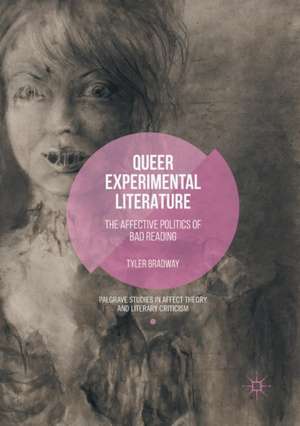Queer Experimental Literature: The Affective Politics of Bad Reading: Palgrave Studies in Affect Theory and Literary Criticism
Autor Tyler Bradwayen Limba Engleză Paperback – 7 iun 2018
Preț: 236.02 lei
Nou
Puncte Express: 354
Preț estimativ în valută:
45.17€ • 46.98$ • 37.29£
45.17€ • 46.98$ • 37.29£
Carte tipărită la comandă
Livrare economică 14-28 aprilie
Preluare comenzi: 021 569.72.76
Specificații
ISBN-13: 9781349955541
ISBN-10: 134995554X
Pagini: 268
Ilustrații: LXIII, 268 p. 3 illus. in color.
Dimensiuni: 148 x 210 x 21 mm
Greutate: 0.4 kg
Ediția:Softcover reprint of the original 1st ed. 2017
Editura: Palgrave Macmillan US
Colecția Palgrave Macmillan
Seria Palgrave Studies in Affect Theory and Literary Criticism
Locul publicării:New York, United States
ISBN-10: 134995554X
Pagini: 268
Ilustrații: LXIII, 268 p. 3 illus. in color.
Dimensiuni: 148 x 210 x 21 mm
Greutate: 0.4 kg
Ediția:Softcover reprint of the original 1st ed. 2017
Editura: Palgrave Macmillan US
Colecția Palgrave Macmillan
Seria Palgrave Studies in Affect Theory and Literary Criticism
Locul publicării:New York, United States
Cuprins
.-1 Naked Lust: Obscene Relationality and the Turn to Queer Experimental Literature.-2 Reading in Crisis: Queer Hermeneutics as Affective History.-3 The Languages of the Body: Becoming Unreadable in Postmodernity.-4 Queer Exuberance: Visceral Reading and the Politics of Positive Affect.-5 “Permeable We!”: Queer Theory’s (Re)turn to Reading with Feeling
Recenzii
“Queer Experimental Literature’s bold exegeses of iconic figures in postwar culture are to be recommended to any scholar of contemporary letters. … Bradway’s book makes needful interventions at the axis of affect studies and queer theory. … Queer Experimental Literature also takes the pulse of the current debate within English studies over our methods of interpretation.” (Michael Trask, College Literature, Vol. 45 (1), 2018)
Notă biografică
Tyler Bradway is Assistant Professor of English at State University of New York at Cortland, USA.
Textul de pe ultima copertă
This volume argues that postwar writers queer the affective relations of reading through experiments with literary form. Tyler Bradway conceptualizes “bad reading” as an affective politics that stimulates queer relations of erotic and political belonging in the event of reading. These incipiently social relations press back against legal, economic, and discursive forces that reduce queerness into a mode of individuality. Each chapter traces the affective politics of bad reading against moments when queer relationality is prohibited, obstructed, or destroyed—from the pre-Stonewall literary obscenity debates, through the AIDS crisis, to the emergence of neoliberal homonormativity and the gentrification of the queer avant-garde. Bradway contests the common narrative that experimental writing is too formalist to engender a mode of social imagination. Instead, he illuminates how queer experimental literature uses form to redraw the affective and social relations that structure the heteronormative public sphere. Through close readings informed by affect theory, Queer Experimental Literature offers new perspectives on writers such as William S. Burroughs, Samuel R. Delany, Kathy Acker, Jeanette Winterson, Eve Kosofsky Sedgwick, Alison Bechdel, and Chuck Palahniuk. Queer Experimental Literature ultimately reveals that the recent turn to affective reading in literary studies is underwritten by a para-academic history of bad reading that offers new idioms for understanding the affective agencies of queer aesthetics.
Caracteristici
Introduces the concept of "bad reading" as a means of describing the relationship between affect theory, queer theory, and the act of reading Contextualizes "bad reading" within an analysis of postwar experimental authors Illustrates parallels between "bad reading" and sociopolitical topics such as the literary obscenity debates of the early 20th century and the AIDS crisis












